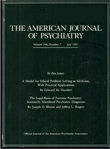Psychiatry's contribution to medical ethics education
Abstract
Two recent trends in medical education, the growth of interest in biomedical ethics and the examination of psychiatry's status in medicine, have important implications for psychiatry. Educators are needed to bring a clinical perspective to bear on ethics instruction, yet psychiatrists risk missing this opportunity. Psychiatrists are uniquely suited to contribute because of their expertise in three areas: an understanding of the affective, nonrational components in ethical thought and behavior, a developmental perspective regarding personal morality, and an appreciation of the rootedness of ethics in the social ethos. Problems with contemporary ethical models of informed consent illustrate the value of psychiatry's contribution.
Access content
To read the fulltext, please use one of the options below to sign in or purchase access.- Personal login
- Institutional Login
- Sign in via OpenAthens
- Register for access
-
Please login/register if you wish to pair your device and check access availability.
Not a subscriber?
PsychiatryOnline subscription options offer access to the DSM-5 library, books, journals, CME, and patient resources. This all-in-one virtual library provides psychiatrists and mental health professionals with key resources for diagnosis, treatment, research, and professional development.
Need more help? PsychiatryOnline Customer Service may be reached by emailing [email protected] or by calling 800-368-5777 (in the U.S.) or 703-907-7322 (outside the U.S.).



